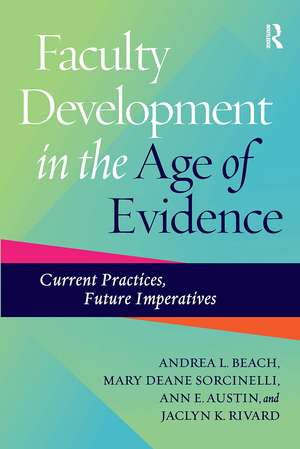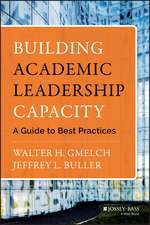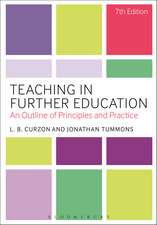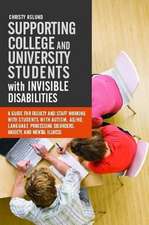Faculty Development in the Age of Evidence: Current Practices, Future Imperatives
Autor Andrea L. Beach, Mary Deane Sorcinelli, Ann E. Austin, Jaclyn K. Rivarden Limba Engleză Paperback – 26 oct 2016
| Toate formatele și edițiile | Preț | Express |
|---|---|---|
| Paperback (1) | 292.88 lei 6-8 săpt. | |
| Taylor & Francis – 26 oct 2016 | 292.88 lei 6-8 săpt. | |
| Hardback (1) | 999.02 lei 6-8 săpt. | |
| Taylor & Francis – noi 2016 | 999.02 lei 6-8 săpt. |
Preț: 292.88 lei
Nou
Puncte Express: 439
Preț estimativ în valută:
56.04€ • 58.66$ • 46.65£
56.04€ • 58.66$ • 46.65£
Carte tipărită la comandă
Livrare economică 31 martie-14 aprilie
Preluare comenzi: 021 569.72.76
Specificații
ISBN-13: 9781620362686
ISBN-10: 1620362686
Pagini: 176
Dimensiuni: 152 x 229 x 13 mm
Greutate: 0.65 kg
Ediția:1
Editura: Taylor & Francis
Colecția Routledge
Locul publicării:Oxford, United Kingdom
ISBN-10: 1620362686
Pagini: 176
Dimensiuni: 152 x 229 x 13 mm
Greutate: 0.65 kg
Ediția:1
Editura: Taylor & Francis
Colecția Routledge
Locul publicării:Oxford, United Kingdom
Public țintă
PostgraduateCuprins
Introduction 1. Who Are We? 2. What Guides Our Work? 3. Where and with Whom do We Work? 4. Services We Focus On 5. Our Approaches to Faculty Development 6. Where are We Going? 7. How Does Assessment Fit in Our Work? 8 )What Have We Learned? Appendix A. Survey Instrument Appendix B. Services Tables by Institution Type Appendix C. Top Issues Faculty Development Should Address in the Next Five Years References About the Authors Index
Notă biografică
Andrea L. Beach is a Professor of Higher Education Leadership and Co-Director of the Center for Research on Instructional Change in Postsecondary Education (CRICPE) at Western Michigan University. She founded and was Director of the Office of Faculty Development at WMU from 2008-2015. She received her Master’s degree in Adult and Continuing Education and her PhD in Higher, Adult, and Lifelong Education (HALE) from Michigan State University in 1998 and 2003, respectively. Her research centers on organizational change in higher education, support of innovation in teaching and learning, faculty learning communities, and faculty development as a change lever. She has been PI and co-PI on several NSF-funded grants focused on instructional change strategies that have produced articles and book chapters on instructional change strategies as well as instruments to self-report instruction and academic department climate for instructional improvement. She was co-author on Creating the Future of Faculty Development (with M.D. Sorcinelli, A.E. Austin, and P.L. Eddy, 2006). She is most recently director of a $3.2 million US DoE FIPSE First in the World project to undertake, document, and measure outcomes of institutional transformation aimed at improving the persistence and academic success of students from low-income backgrounds. Dr. Mary Deane Sorcinelli is the Senior Research Fellow at the Institute for Teaching Excellence and Faculty Development at UMass Amherst. She was awarded, along with two colleagues, an NSF Institutional Transformation Grant through the American Association of Universities (AAU) in Washington, D.C.Mary Deane has directed a number of externally grant-funded projects aimed at promoting educational innovation from the Andrew W. Mellon, Microsoft, and William and Flora Hewlett Foundations, Carnegie Foundation for the Advancement of Teaching, and Pew Charitable Trusts. She has served on advisory boards and as an external evaluator of NSF ADVANCE CC
Recenzii
“Overall, Faculty Development in the Age of Evidence is an essential resource for the field of faculty development and for the higher education sector. Beach and colleagues provide an updated examination of the status of the field, and create meaningful arguments in favor of continually strengthening faculty development. Beyond that, the book asks important questions for practitioners to reflect and act upon, in order to continue evolving the field of faculty development and the overall impact of higher education in society.”
Teachers College Record
"Faculty Development in the Age of Evidence: Current Practices, Future Imperatives (2016) is essential for all in the field of faculty development, regardless of years in service, as well as those considering entering the field and those with leadership roles at higher education institutions. The main focus of the text is on “faculty development today—its purposes, the roles of developers, key priorities, and new directions” (Beach et al., 2016, p. 12). This book provides a broad view of who faculty developers are, the work they do, and the work they wish to expand in the future. Each chapter answers a posed question (e.g., What Guides Our Work?), and most chapters end with a conclusion and highlights, making the book conducive for referencing in the future.
Overall, this book depicts a bird’s eye view of a field that continues to grow, gain recognition, and find its place within the structure of higher education institutions. To my knowledge, there is no other literature that provides such a comprehensive overview of the field. This book is an excellent guide for gaining insight into cross-institutional practices and it may help guide developers in planning for the future. Faculty Development in the Age of Evidence: Current Practices, Future Imperatives is a significant addition to the literature on faculty development."
Journal of Faculty Development
Teachers College Record
"Faculty Development in the Age of Evidence: Current Practices, Future Imperatives (2016) is essential for all in the field of faculty development, regardless of years in service, as well as those considering entering the field and those with leadership roles at higher education institutions. The main focus of the text is on “faculty development today—its purposes, the roles of developers, key priorities, and new directions” (Beach et al., 2016, p. 12). This book provides a broad view of who faculty developers are, the work they do, and the work they wish to expand in the future. Each chapter answers a posed question (e.g., What Guides Our Work?), and most chapters end with a conclusion and highlights, making the book conducive for referencing in the future.
Overall, this book depicts a bird’s eye view of a field that continues to grow, gain recognition, and find its place within the structure of higher education institutions. To my knowledge, there is no other literature that provides such a comprehensive overview of the field. This book is an excellent guide for gaining insight into cross-institutional practices and it may help guide developers in planning for the future. Faculty Development in the Age of Evidence: Current Practices, Future Imperatives is a significant addition to the literature on faculty development."
Journal of Faculty Development
Descriere
This book describes how these faculty development and institutional needs and priorities are being addressed through linkages, collaborations, and networks across institutional units; and highlights the increasing role of faculty development professionals as organizational “change agents” at the department and institutional levels.











